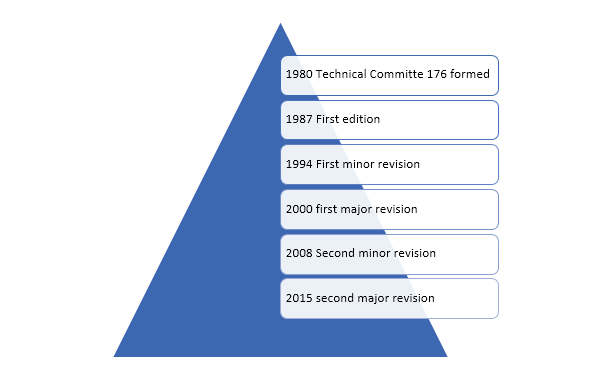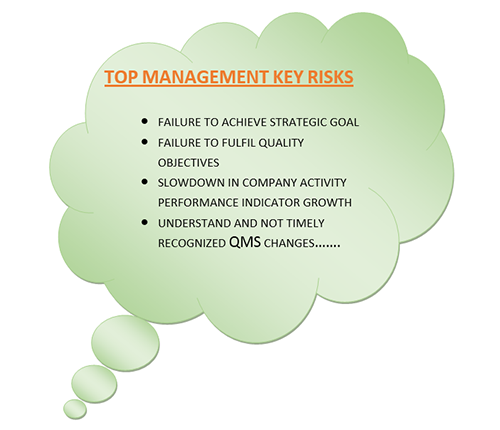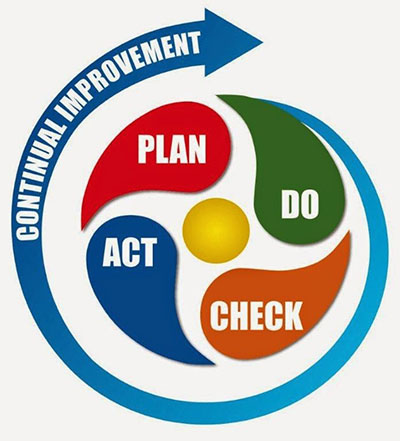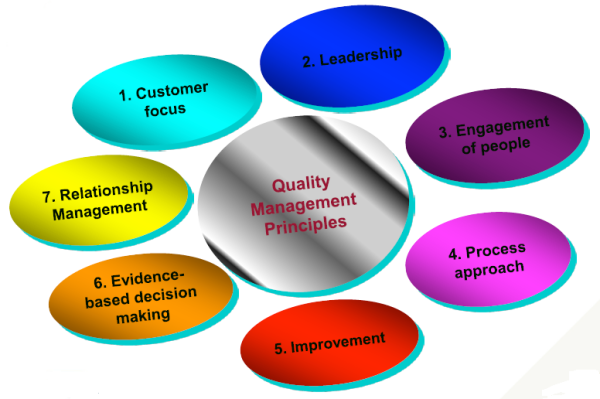ISO 9001:2015
What is ISO 9001:2015?
ISO 9001:2015 Quality Management System is internationally recognised as the globally leading quality management standard and has been implemented by over 170 countries globally. ISO 9001 implemented, to its full potential, becomes an invaluable asset to your organisation.
ISO 9001: 2015 is an international standard related to quality control and applies to all kinds of business units and all organizations of activities. ISO 9001: 2015 provides a framework for meeting the changing quality requirements of society, the economy, and the environment.
The purpose of the standard is to assist companies in meeting statutory and regulatory requirements relating to their product while achieving excellence in their customer service and delivery. The standard can be used throughout an organisation to improve the performance or within a particular site, plant or department.
ISO 9001 contains eight key principles of quality management which is not auditable but do form the fundamental characteristics of quality management:
- Customer focus and customer satisfaction
- Leadership
- Involvement of people
- Process approach
- Systematic approach to management
- Continual improvement
- Factual approach to decision making
- Mutually beneficial supplier relationship
Benefits of ISO 9001:2015
- Become more cost efficient.
- Product and services meet International Standard of Quality.
- Enhance your product & service quality to approach increased customer satisfaction.
- Helps establish appropriate systems to control manpower systematically and monitor their performances.
- Enhanced customer satisfaction and improved customer loyalty leading to repeat business
- Increased revenue and market share obtained through flexible and fast responses to market opportunities.
- Integration and alignment of internal processes which will lead to increased productivity and results.
- Improved communication, planning and administration processes.
What are the core benefits of ISO 9001:2015?
- Ensure that your products and services are effectively applied and applicable to customers Legal and regulatory requirements.
- Measure the progress towards continuous improvement of business Performance to create a benchmark.
- Creation of a knowledge database for effective exchange of corporate knowledge.
- Stakeholders and risk management.
- High level structure (HLS) makes integration with multiple standards easier.
- QMS closely coordinated with core business process
Successful companies are motivated to provide quality. Quality is its operation method, customer service standards, and products to provide. It is a strategic vision for continued transformation to improve brand equity and image and has facilities to acquire new opportunities in the rapidly increasingly competitive global market.
Advantage of ISO 9001:2015:
Proper quality control can often improve business that will have positive effect on investment, market share, sales growth rate, sales margin, competitive advantage, litigation avoidance. According to ISO, the 2015 version of this standard has the following advantages.
- By evaluating their context, organizations can define those who are affected by their work and who they expect. This will enable you to identify clearly stated business goals and new business opportunities.
- Organizations can identify and address the risks associated with the organization.
- By placing customers first, we can consistently meet customer needs and increase customer satisfaction. This will result in the expansion of more custom, new customers, and organizations business.
- Organizations work in a more efficient way as all processes are coordinated and understood by everyone. This improves productivity and efficiency and reduces internal costs.
- The organization meets the necessary legal and regulatory requirements.
- As some sectors and customers require ISO 9001 before doing business, organizations can enter new markets.
ISO 9001:2015 Timeline & Brief History

A brief introduction on the basis of ISO 9001
ISO 9001 is an international standard of quality management system (QMS) issued by ISO (International Organization for Standardization). This standard was updated most recently in 2015 and is called ISO 9001: 2015. ISO 9001 must be agreed upon by a number of Member States to be internationally recognized standards approved in most countries of the world. ISO 9000 defines terms and principles behind ISO 9001. In addition, ISO 9004 contains guidance for making the ISO 9001 quality management system more successful.
What is a quality control system (Quality Management System – QMS)?
A quality management system, often referred to as QMS, is a collection of policies, processes, documented procedures and records. The collection of this document defines a set of internal rules that govern how your company creates your products and services and provides them to customers. The QMS should be tailored to the needs of your company and the products and services offered by customers, but the ISO 9001 standard is designed to ensure that QMS does not overlook important elements necessary for its success.

ISO have adopted process approach which follows PDCA act (Plan – Do – Check – Act) cycle which brings in a drive for continued perfection in the process of organisation.

Another important key of ISO 9001 is 7 basic Principles of Quality Management System. These are the seven pillars on which an ideal Quality Management System is built.

Problems you generally face in ISO 9001
- Organisations face problems in auditing due to lack of proper knowledge, training and required competence to interpret the requirements of the standard.
- Half knowledge is fatal. The absence of complete knowledge regarding ISO 9001 conformity and determining a suitable system can land you in big trouble along with a huge amount of billsand expenditure.
- Lack of commitment to establish, implement and maintain ISO 9001 based quality management system, results in non-achievement of desired results.
- Adopting a bureaucratic and incompatible ISO 9001 system can prove painful, redundant and build fear in employs which can degrade their motivation.
- Organisations may be trying their best, but still failing to reap the results. What they aren’t aware of is that they may not be having adequate resources with the more appropriate management solutions.
- Auditing, Training and improving quality can cost you more than you can input, which makes most of the organisation to step out of the process.
- Unprofessional and incorrect offers given by Consultants that displays a very wide range of pricing. This creates confusion and hampers the Consultant selection process.
- Possibility that the Consultant guides through, and emphasizes on massive documentation which the organization cannot handle, and somehow aren’t the mandatory requirement of the international standard too.
- Selection of a certification body that does not bear or maintain enough credibility, resulting in loss of accreditation.
Worried? You don’t have to, we have amazing solutions for you.
- Ascent INSPECTA provides complete understanding and proper training to personnel that can solve quality issues easily. Ascent INSPECTA provides trainings based on need of the organization and not unnecessary ones.
- The Ascent INSPECTA Solutions Architect guides you through the entire ISO 9001 compliance and implementation till achievement of certification which will give you a sigh of relief.
- Ascent INSPECTA helps through imparting right education regarding coordination and motivation of management and employees help you achieve ISO 9001 standard conformity.
- Ascent INSPECTA provides required training, education and confidence to employees thus making QMS a regular habit for them which eradicates fear and dopes confidence.
- Ascent INSPECTA expert guiding you about the inadequate resources will resolve various problems.
- Hiring Ascent INSPECTA can guide you with proper budget knowledge without you paying additional expenses.
- Ascent INSPECTA based Solutions Architects perform a detailed business profile analysis and undertake a gap analysis before the project outline is designed. No repeats, no non-useful documents are ensured.
- Ascent INSPECTA facilitates an in-depth and professional auditing services that is significantly more stringent that the audits done by certification bodies. This ensures no failure during external audits.
- Ascent INSPECTA utilizes methods of making use of available resources within the organization that helps reduce expenses.
- Ascent INSPECTA integrates the existing system in a synchronized manner, to demonstrate ISO 9001 conformity. Various models and elements like 5S, Six Sigma, Kaizen, TQM etc. are integrated based on the need and capabilities of the client organization.
- Ascent INSPECTA works 24X7, to cater to the needs of its customers all over the inspecta. This gives you ample opportunity to demand our services even in the odd hours and holidays.
- Ascent INSPECTA has a general practice of complete analysis before an offer is given. It is extremely improbable that the total expenditure goes beyond the budgeted figures, unless there are special requirements from the client’s end. “Not a single penny extra”, is a general motto that each Ascent INSPECTA employee abides by.
Get in Touch! Ask us any question/query on +91-9867-180-395. We would be happy to answer your concerns. You can also drop an email at info@ascentinspecta.com
Frequently Asked Questions (FAQ)
- The scope of the organization
- The Quality Policy and Quality Objectives of the organization
- A Quality Manual
- Standard Operating Procedures
- Records specific to each process or department, such as Sales, Purchase, Production, Quality Assurance, Maintenance, and Customer Service.
